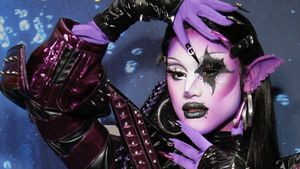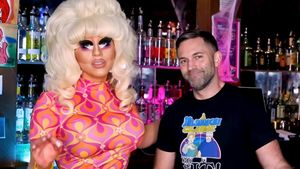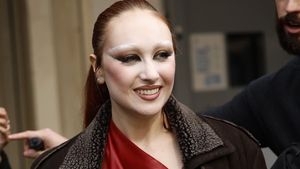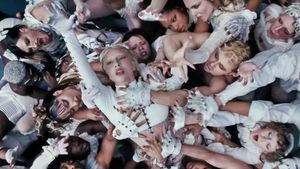 I Must Not Think Bad Thoughts: Drive-by Essays on American Dread, American Dreams by Mark Dery (University of Minnesota Press, $25)
I Must Not Think Bad Thoughts: Drive-by Essays on American Dread, American Dreams by Mark Dery (University of Minnesota Press, $25)
Author Mark Dery is never at a loss for source material, and this inventive and immenently readable collection of essays covers a variety of peculiar topics including porn fantasies of Star Trek fans, Facebook as Limbo of the Lost, George W. Bush's fear of his inner queer, the homoerotic subtext of the Super Bowl, the sadism of dentists, the branding of Hitler, the sexual identity of 2001's HAL (think you know?), the suicide note considered as a literary genre, Lady Gaga, and the polymorphous perversity of Madonna's big toe. It's both wonderfully provocative and absurd, but always well-measured and intellectually thoughtful -- a winning combination in a collection like this. (UPress.UMN.edu) -- Diane Anderson-Minshall
 Why Be Happy When You Could Be Normal? by Jeanette Winterson (Grove Press, $25)
Why Be Happy When You Could Be Normal? by Jeanette Winterson (Grove Press, $25)
Esteemed author Jeanette Winterson tells stories of her life in a memoir that is as powerful as any of her novels (Oranges Are Not the Only Fruit, Sexing the Cherry, etc.). She declines to say how much of Oranges (which was turned into a film, below)is autobiographical, but she paints a portrait of growing up in an environment just as terrifying as the one in that novel, with a fanatically religious, "flamboyant depressive" mother who stays up all night to avoid sleeping with her husband, locks her daughter out of the house or in the coal bin as punishment, and frequently says "The Devil led us to the wrong crib" when discussing Jeanette's adoption. Mrs. Winterson, as the author always refers to her adoptive mother, provides the book's title as well; that was her response to Jeanette's disclosure that she was happily in love with a woman. Winterson documents her escape from this household, first to a supportive teacher's home, then to Oxford University, and skips over the middle of her life to a compelling story of her recent years, marked by an emotional breakdown and a search for her birth mother. This is a beautifully written, sometimes disturbing, consistently riveting memoir. (GroveAtlantic.com) -- Trudy Ring
 The Declining Significance of Homophobia: How Teenage Boys Are Redefining Masculinity and Heterosexuality by Mark McCormack (Oxford University Press, $50)
The Declining Significance of Homophobia: How Teenage Boys Are Redefining Masculinity and Heterosexuality by Mark McCormack (Oxford University Press, $50)While stories of bullying and suicide have dominated the news about LGBT teens in the past few years, there are signs that the situation is improving greatly, at least in some locales. British sociologist Mark McCormack spent months talking to boys at three high schools in the U.K. and found straight kids increasingly accepting of their gay peers. Antidiscrimination laws, visibility of LGBT celebrities, the presence of positive gay characters in movies and TV, and grassroots activism have helped foster a culture in which "masculine" doesn't have to mean homophobic, he writes. Progress is not universal, he notes, but it's getting better in the U.S. too, and not just after high school. His book has a scholarly tone and some sociological jargon, but it's largely accessible and has an encouraging message that should not lull us into complacency but inspire us to continue efforts to make schools -- and the world -- a welcoming environment for all. (OUP.com) -- Trudy Ring
 Sucking Sherbet Lemons by Michael Carson (Cutting Edge Press U.K., $17)
Sucking Sherbet Lemons by Michael Carson (Cutting Edge Press U.K., $17)
Long considered a coming-of-age classic, Sucking Sherbet Lemons, which was first released in 1988, follows Benson, a chubby gay 14-year-old Catholic boy in the 1960s. In a story both hilarious and heart-rending, Benson attempts to reconcile being gay -- at a time when homosexuality was still illegal -- with his religious zeal, leading to some peculiar places and amusing setups along the way. The book is fun and resonant, and sure to appeal to a whole new generation of readers -- gay and straight. (CuttingEdgePress.co.uk)-- Diane Anderson-Minshall
 Riding Fury Home by Chana Wilson (Seal Press, $17)
Riding Fury Home by Chana Wilson (Seal Press, $17)
In 1958, when Chana Wilson was 7, her mother held a rifle to own her head and pulled the trigger. The gun jammed and she was taken away to a mental hospital. It would be decades later -- after the author cares for her heavily medicated and often suicidal mother -- that she learns what caused her mother so much pain. She was a lesbian and had been undergoing psychiatric treatment aimed at curing her homosexuality. Now, 40 years later, Wilson's book looks back at her mother's trajectory from that psych patient to an out lesbian int he '70s heyday of the women's movement, as well as Wilson's own coming-out and how that disclosure strengthened their bond in the subsequent years. Wilson paints a vivid picture of how homophobia and mental illness dovetailed in the pre-Stonewall era and how salvation came in many forms for lesbians in the age of Aquarius, and it offers a complex tale of lesbian life and our sometimes convulted emotional baggage found even in the modern era. A must-read for any queer woman. (RidingFuryHomeBook.com) -- Diane Anderson-Minshall
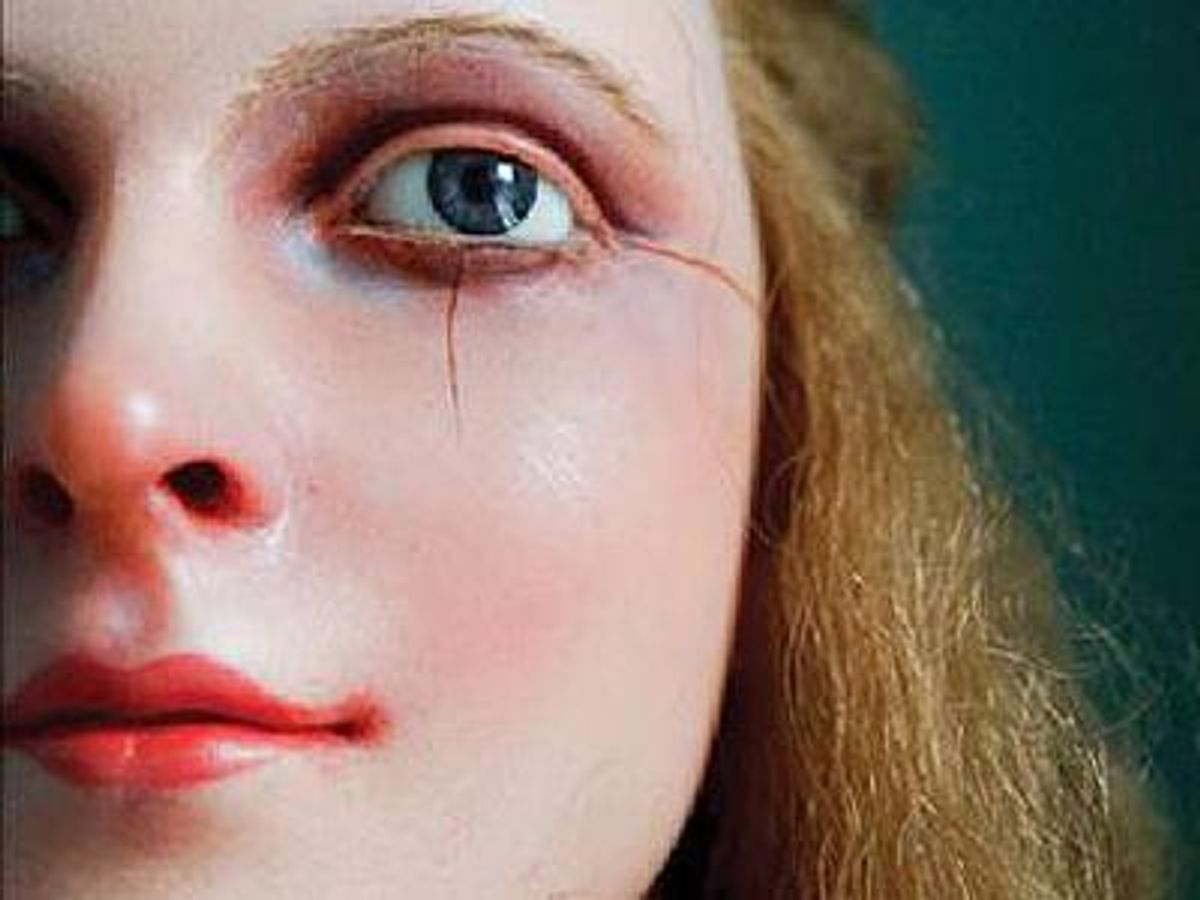

 I Must Not Think Bad Thoughts: Drive-by Essays on American Dread, American Dreams by Mark Dery (University of Minnesota Press, $25)
I Must Not Think Bad Thoughts: Drive-by Essays on American Dread, American Dreams by Mark Dery (University of Minnesota Press, $25) Why Be Happy When You Could Be Normal? by Jeanette Winterson (Grove Press, $25)
Why Be Happy When You Could Be Normal? by Jeanette Winterson (Grove Press, $25) The Declining Significance of Homophobia: How Teenage Boys Are Redefining Masculinity and Heterosexuality by Mark McCormack (Oxford University Press, $50)
The Declining Significance of Homophobia: How Teenage Boys Are Redefining Masculinity and Heterosexuality by Mark McCormack (Oxford University Press, $50) Sucking Sherbet Lemons by Michael Carson (Cutting Edge Press U.K., $17)
Sucking Sherbet Lemons by Michael Carson (Cutting Edge Press U.K., $17)  Riding Fury Home by Chana Wilson (Seal Press, $17)
Riding Fury Home by Chana Wilson (Seal Press, $17)

































